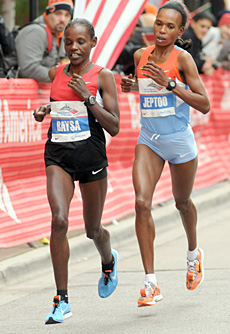|
Post-Race Content:
Men's Race Writeup | Women's Race Writeup | Complete Results
2012 Bank of America Chicago Marathon - Women's Race
by John Elliott and Sharon Ekstrom

photo: Sean Hartnett/Chicago Marathon
|
The Chicago Marathon: 2012 vs 2011
The Chicago Marathon is known for fast times and strong fields. But what a difference one year can make in a race and how unpredictable the distance can be - as the story for the 2012 marathon was opposite to that for 2011. In 2011, the pre-race story was: "can Liliya Shobukhova three-peat?" For 2012, the pre-race story was nearly the same: "can Liliya Shobukhova four-peat?" But the real story and the outcome of the 2012 race was opposite.
Injuries Set the Stage
While the 2012 pre-race attention was, as in 2011, still on Shobukhova - the underlying question was whether Shobukhova was healthy enough to compete effectively. Shobukhova had not finished a race since winning the 2011 Chicago Marathon. She was out for injury and had started only two races in the prior year and finished neither including a DNF at the 2012 Olympic Marathon. At the pre-race press conference, Shobukhova almost seemed to tear up as she talked about her running; and MarathonGuide.com staff commented on the knowing looks other runners gave us as we spoke them - knowing that Shobukhova might not be the dominant force that she had been for the previous three years.
Injury seemed to be a theme for the 2012 Marathon - and beyond Shobukhova's questionable status, two other women had had trouble with remaining injury free. It was well known that Lucy Kabuu, the woman with the second fastest personal best time in the field behind Shobukhova, had some Achilles issues that had affected her training. And another favorite, Worknesh Kidane, was experiencing some Hamstring problems.
A "Conservative" Start
Perhaps because of the status of some of the athletes, the 2012 Chicago Marathon started off conservatively. But a conservative start at Chicago has a different connotation than at most other marathons. In Chicago, the women started the race with a strong pace that seemed to predict a 2:23 finish and went through the halfway mark in 1:11:13 with nine women in the pack. We call this "conservative" only when we compare it to the previous two Chicago Marathons: in 2011, a pack of three women went through the half in 1:09:25; in 2010, five women went through the half in 1:10:20 (on a warm day). Compared to most marathons in the world, nine women running 1:11:13 is unheard of - in Chicago, with Liliya Shobukhova in the field, it seemed "slow."
The Chicago Marathon does employ pacemakers in the race, but the women seemed to ignore the pacers and simply key off Shobukhova. Ultimately, the "conservative" pace prevented the carnage that is often seen in marathons with runners trying to run faster than they really can just to stay with the pack. Through the first 16 miles various women would work their way to the lead. Maria Konovalova tried to push the pace for some time, but mostly it was Liliya Shobukhova and Lucy Kabuu who would lead.
Deep Results
By 18 miles, Lucy Kabuu began to push the pace and she and three others: Fatuma Sado, Rita Jeptoo and Caroline Rotich were moving away. In the next miles, Atsede Baysa would catch back up to the leaders; Fatuma Sado would fade back and then Caroline Rotich would fall back: and then there were three: Lucy Kabuu, Atsede Baysa and Rita Jeptoo. In most situations, Lucy Kabuu would be the favorite but with missed training she could not hold the pace. Rita Jeptoo and Atsede Baysa would then continue running - stride for stride - to a finish separation of milliseconds even as the official results would place Atsede Baysa at 2:22:03 and Rita Jeptoo at 2:22:04. Lucy Kabuu continued on to third place in 2:22:41, Liliya Shobukhova finished fourth in 2:22:59 and Caroline Rotich finished fifth in 2:23:22. To put these in perspective, never before had five women run under 2:24 in the same race in Chicago and only in 2002 had Chicago seen four women under 2:23 - the results were amazingly deep. Of the finishers, Rita Jeptoo's finish may have been the most impresive, as she had been out of racing for years and bettered her previous personal best that was set 6-1/2 years earlier...
An American Debut - A new American Star?
Renee Metivier Baillie was a track star just beginning to choose to move up to the roads and the Marathon. The 30-year old's road road history consisted of just one race of Half Marathon distance or further: the 2010 USA Half Marathon Championships where she struggled in the final miles, but finished fourth in 71:51. Renee told us that experience had made her somewhat afraid of distance races. Stepping up to distance running again, Metivier Baillie decided in August 2012 that she would try a debut at the marathon distance pending a successful run at the USA 20K Championships at the beginning of September. With a win at the 20K, Metivier Baillie's debut at the Chicago Marathon was confirmed. Pre-race, Metivier Baillie was evasive when asked about her goals for her first marathon; but after the race she admitted what the goal was: to run the fastest debut marathon ever run by an American woman.
The top 10 finishers:
1. Atsede Baysa (ETH) 2:22:04 - $100,000 + $10,000
2. Rita Jeptoo (KEN) 2:22:04 - $50,000 + $10,000
3. Lucy Kabuu (KEN) 2:22:41 - $25,000 + $10,000
4. Liliya Shobukhova (RUS) 2:22:59 - $15,000 + $10,000
5. Caroline Rotich (KEN) 2:23:23 - $10,000 + $10,000
6. Mariya Konovalova (RUS. 2:25:37
7. Fatuma Sado (ETH) 2:26:09
8. Rene Metivier Baille (USA) 2:27:17 - $10,000 + $2,000
9.Dot McMahon (USA) 2:32:11 - $7,500 + $2,000
10. Stephanie Pezzullo (USA) 2:32:42 - $5,000 + $2,000
|





